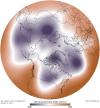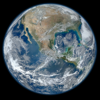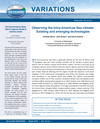All Announcements

Submit an abstract to the 97th AMS Annual Meeting
The upcoming AMS annual meeting will bring together researchers across the weather, water, and climate community. There are multiple conferences and symposiums, as part of the meeting, that will be of interest to the CLIVAR community, such as the 29th Conference on Climate Variability and Change. Abstracts are due August 1.

Save the date: Arctic Change & Its Influence on Mid-latitude Weather & Climate workshop
Join the Arctic Mid-latitude Working Group for a workshop to explore the possible links between Arctic change and mid-latitude climate and weather that has spurred a rush of new observational and modeling studies. This meeting will take place in Washington, DC on February 1-3, 2017.

New US CLIVAR Working Group on the Changing Width of the Tropical Belt
Welcome to the new US CLIVAR Working Group on the Changing Width of the Tropical Belt. The intent of the working group is to further the understanding of new insights that call into question the prevailing view about the nature and causes of changes in the width of the tropics.

Submit ocean science priority ideas for the next Presidency
The Consortium for Ocean Leadership, American Geophysical Union, and US CLIVAR are seeking input from a wide audience of ocean stakeholders and scientists to help inform future ocean science priorities in the next Administration. If you would like to contribute to the recommendations, now is the time to do so. Please submit your requests in the form of broad themes or goals, followed by a few specific actions to accomplish them, by May 13.

Call for US CLIVAR-sponsored workshops
Requests are now being accepted for US CLIVAR-sponsored workshops. Community workshops are used to coordinate, develop, plan, and implement new or focused activities for the benefit of the scientific community and relevant to the goals of US CLIVAR. The deadline for submission is May 6.

Apply to attend Forecasting ENSO Impacts on Marine Ecosystems of the US West Coast
Participants are invited to attend this workshop to help develop a framework for using ENSO forecasts to predict changes in marine ecosystems off of the US West Coast, which shows large imprints of ENSO on biological processes. Due to the limited size of the workshop, participants must apply by May 2.

Submit a white paper for the Decadal Survey for Earth Science and Applications from Space
The National Academies is conducting the 2017-2027 Decadal Survey for Earth Science and Applications from Space and is requesting a second round of community white papers to inform the Survey. This request for information builds upon the initial set of white papers submitted last year (responses available on the website). The purpose of this second set of papers is to provide ideas for specific science and applications targets under the following five themes: (i) Global Hydrological Cycles and Water Resources, (ii) Weather and Air Quality: Minutes to Subseasonal, (iii) Marine and Terrestrial Ecosystems and Natural Resource Management, (iv) Climate Variability and Change: Seasonal to Centennial, and (v) Earth Surface and Interior: Dynamics and Hazards. White papers are due April 30.

Comments sought for white paper on translating process understanding to improve climate models
Comments are sought on a draft white paper based upon the October 2015 US CLIVAR workshop, Translating Process Understanding to Improve Climate Models. The white paper is intended to summarize questionnaire responses, workshop presentations, discussions, and recommendations to inform both the broad research community and agency considerations on the need for a coordinated effort to translate process understanding into climate model improvements over the next decade. Comments on the current draft are due by April 29.

Submit a session proposal to AGU Fall Meeting
The annual AGU Fall Meeting will be held from December 12-16 in San Francisco. Similar to last year, US CLIVAR encourages the community to submit session proposals highlighting work of the Panels, Working Groups, Science Team, and other US CLIVAR supported activities. The deadline to submit a proposal is April 20. We also encourage you to let the Project Office know about your session, so we can help advertise it.

2016 Variations Winter Edition: The Intra-Americas Seas and its role in climate and extreme events
The Intra-Americas Seas (IAS) plays a vital role in climate variations of the surrounding North American continental region. And yet, the IAS is one of the most poorly observed ocean regions of the world and one where almost all climate models display large bias. This collection of articles highlights the value of sustained and expanded monitoring, research into mechanisms influencing variability, and modeling to advance predictions that will underpin the development of usable climate information to address societal needs in the region.
